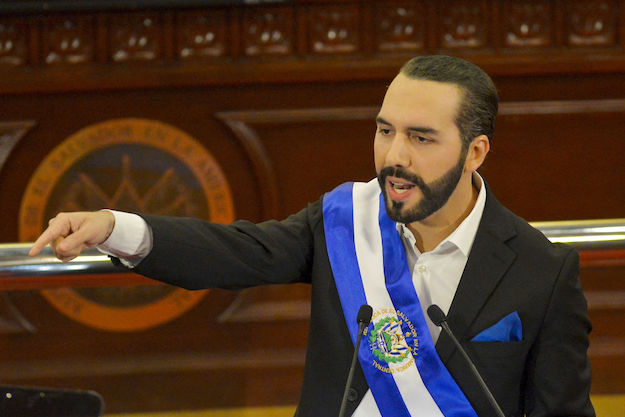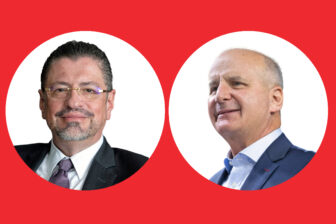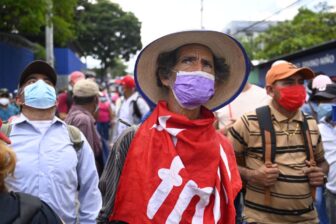Even if you see the crash coming, you can still feel shocked when it happens.
On Dec. 8, in the lead up to the U.S. Summit of Democracies – to which El Salvador was not invited – the U.S. Treasury Department placed two senior Salvadoran officials very close to President Nayib Bukele on its Magnitsky Act corruption sanctions list, eliminating their access to the U.S. financial system. Treasury claimed that El Salvador’s Vice Minister of Justice and Public Security Osiris Luna Meza and the chairman of its Social Fabric Reconstruction Unit, Carlos Marroquín Chica, had met repeatedly in secret with two Salvadoran gangs (Mara Salvatrucha, also called MS-13, and Barrio 18) to negotiate a reduction in homicides and the provision of political support for the president’s party in return for privileges for jailed gang leaders. Salvadoran digital newspaper El Faro first reported in 2020 on the alleged deal with the gangs, but now the U.S. was affirming the accusations.
It got worse. On Dec. 9, the Treasury Department applied the same sanctions to Bukele’s chief of staff, Martha Carolina Recinos, for alleged suspicious procurement and pandemic-related purchases, and misuse of government food baskets for COVID victims.
Bukele responded furiously. He rejected the accusations, asserting that the U.S. only sought El Salvador’s “absolute submission,” rather than its friendship or cooperation. He tweeted and mischaracterized photos of WhatsApp exchanges with the recently departed U.S. chargé d’affaires, Ambassador Jean Manes, in an attempt to discredit U.S. support for the rule of law. On Dec. 12, he blamed an opposition protest in San Salvador on alleged Biden administration use of foreign assistance to support “communists.”
Where does this leave us?
The bilateral relationship under the Biden administration was guaranteed to bump against the guardrails of diplomacy, if not jump over them altogether. The U.S. sought to reduce Salvadoran migration to the U.S. by incentivizing better security (including anti-gang efforts and now stalled extraditions of gang leaders to the U.S.) and economic growth, while also seeking to reduce corruption and protect democratic institutions.
Bukele’s goals were different: He sought to amass personal power, which he justified by achieving what his electorate wanted – including a dramatic drop in homicides and gang violence, ostensibly through better policing, and good marks on the pandemic, notwithstanding Treasury’s accusations of health-sector corruption. Moreover, he saw no reason to pander to an over-the-hill United States.
An anti-establishment candidate who stunned both the rightist Arena and the leftist FMLN parties in the 2019 elections, Bukele is enormously popular. Reminiscent of Hugo Chávez, he projects empathy and hope to a population jaded by 30 years of Arena and FMLN governments; like Chávez, Bukele’s message is that voters should trust him rather than institutions and procedures. He rejects criticism, demands loyalty and emphasizes his unique talent to steer El Salvador through its latest crisis. His Nuevas Ideas party’s huge mid-term victory in February produced a super-majority that allowed the new Congress in May to replace the sitting attorney general. The new attorney general promptly terminated CICIES, the joint Salvadoran-OAS anti-corruption effort that had pursued reports of government corruption. The new Congress also replaced all magistrates in the constitutional section of the Supreme Court. In September, the new court declared that Bukele could run for re-election, notwithstanding the prohibition against this in the constitution. In November, Bukele proposed a law that would charge a 40% tax on all overseas financing of non-governmental organizations. He views civil society – and independent media – as political enemies.
In response, the U.S. criticized the government for undermining democracy and rule of law. It suspended foreign assistance to the Supreme Court and the attorney general, and in July canceled visas for Salvadoran officials suspected of corruption, including Luna, Marroquín and Recinos. The Treasury Department takes months to approve Magnitsky Act sanctions, so it is most likely that the Biden administration had known since early 2021 about the reported Salvadoran deal with the gangs, and that it had addressed this in private with Bukele without success. The U.S. made an extra effort in May to engage Bukele by sending Manes back as the interim chargé d’affaires. Manes had a positive relationship with Bukele in 2019 when he was a presidential candidate, and she understood the Salvadoran environment. Bukele, however, was uninterested in an accommodation with the U.S. at the expense of his broader ambitions, and the U.S. withdrew Manes in November.
The sanctions suggest that the U.S. has little hope that Bukele will alter his autocratic ambitions, and that additional sanctions are likely. The U.S. response to other challenges to democracy in the region – Guatemala, Nicaragua and Honduras – would benefit from clear U.S. responses to challenges in El Salvador. And it’s not just the National Security Council, State Department, Treasury and USAID that are skeptical about Bukele. The U.S. Department of Justice and the FBI have invested considerable effort in prosecuting gang leaders in the U.S. and extraditing them from Central America. These anti-gang efforts retain bipartisan support and thus complicate Bukele’s efforts to go around Biden on Capitol Hill.
The Treasury sanctions’ initial impact will be to generate fears among Bukele’s other senior officials and operators that they could be the next to lose their and their families’ U.S. visas. They may also be blocked from any international financial transaction that passes through the United States. Even more serious is a Dec. 10 Reuters report that the U.S. is preparing indictments against Luna and Marroquín. If true, this could motivate some targets to turn on the president. It’s unclear just how deep Bukele’s Salvadoran operators’ loyalty to him runs, since his inner circles comprise to a large extent his own family and Venezuelans who assisted his presidential run.
Still undecided is El Salvador’s bid for an agreement with the International Monetary Fund that would help it meet January 2022 payments of $800 million to Salvadoran bondholders. Bukele’s declaration that bitcoin would join the U.S. dollar as legal tender in El Salvador, and his bizarre roll-out event last month of a new “Bitcoin City” (his entrance was arranged to appear as if he had landed in a spacecraft), suggest he may believe the U.S. and the IMF will swallow concerns about governance and transparency (and bitcoin) in order to avoid an economic crisis that would send more Salvadoran migrants to the U.S. Bukele may even believe that China could step in with greater assistance, though China has not signaled such interest.
In sum, Bukele’s confrontation with the U.S. seems likely to deepen. It may not affect his popular support in the short term, which feeds off Bukele’s steady beat of aspirational rhetoric, sarcasm (he put “dictator” as his job title on Twitter after one U.S. criticism), jabs against opponents and announcements of government achievements. But El Salvador’s leader faces multiple dilemmas: how to keep his support high in 2022 even as the demand for government resources outstrips supply; how to ensure his operators’ loyalty; and how he’ll come to grips with U.S. sanctions, and whatever may be coming next from Washington. For the moment at least, Bukele seems more likely to double down than to change course.
—
McFarland (@AmbMcFarland) is a retired Foreign Service officer who was the U.S. ambassador to Guatemala from 2008 to 2011. Earlier he served in El Salvador during its civil war. His career has focused on the Andean countries and Central America, in addition to Iraq and Afghanistan.






